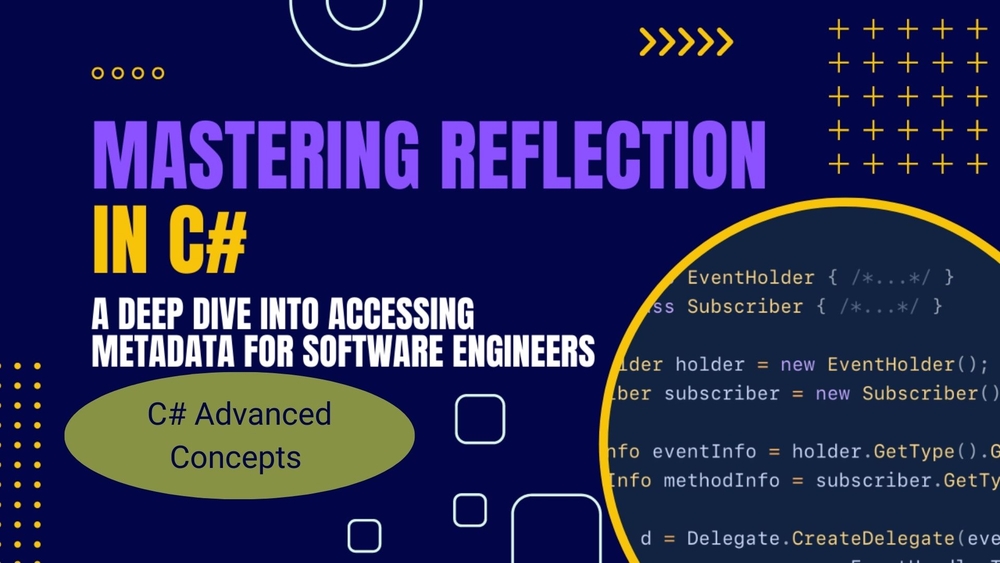Published
- 4 min read
A Deep Dive into Delegates, Events, Generics, Async/Await, and LINQ

Advanced C# Programming: A Deep Dive into Delegates, Events, Generics, Async/Await, and LINQ
This comprehensive guide delves into advanced C# concepts, enhancing your programming proficiency. We’ll explore intricate aspects like delegates, events, generics, async/await tasks, and LINQ, providing detailed code examples and best practice guidelines. We’ll also touch upon design patterns, user actions, query operators, and C# attributes.
Why Advanced C# Matters: The Abstraction Factor
Advanced C# topics are distinguished by their abstraction. Abstract concepts in programming represent universal patterns that can be implemented to solve various real-world problems. Mastering these concepts leads to:
- Better code reuse
- Cleaner, more maintainable code
- Enhanced design flexibility and extensibility
- Effective unit testing
- Improved application performance and efficiency
While these advanced patterns can appear complex initially, the payoff in terms of code quality and efficiency is significant.
Example: Leveraging Abstraction with LINQ
A simple example illustrates the power of abstraction. Imagine calculating the total salaries of employees, including bonuses. A traditional approach might involve a foreach loop:
decimal totalSalary = 0;
foreach (IEmployee employee in employees)
{
totalSalary += employee.Salary;
}
Console.WriteLine(totalSalary);Using LINQ, we can achieve the same result with a single line:
decimal totalSalary = employees.Sum(e => e.Salary);
Console.WriteLine(totalSalary);This conciseness and clarity are hallmarks of advanced C# techniques.
Core Advanced C# Concepts
Let’s briefly define some key concepts:
- Delegates: Type-safe function pointers referencing methods with specific parameters and return types.
- Events: Special multicast delegates invoked within the declaring class/struct, allowing other classes to subscribe and receive notifications.
- Generics: Enable designing classes and methods that defer type specification until instantiation, promoting code reuse and type safety.
- Extension Methods: Add methods to existing types without modification, enhancing code extensibility.
- Lambda Expressions: Concise representations of anonymous methods, simplifying code.
- LINQ (Language Integrated Query): Enables querying strongly typed collections using language keywords and familiar operators.
- Async/Await: Facilitates asynchronous programming, improving application responsiveness.
- Attributes: Add metadata to code elements, enabling declarative programming and runtime inspection via reflection.
- Reflection: Allows inspecting and interacting with code metadata at runtime.
Delegates: Function Pointers for Flexibility
Delegates provide a way to reference and invoke methods dynamically. This is crucial for event handling, asynchronous callbacks, and flexible code design. A simple example:
// Delegate definition
public delegate void LogDelegate(string text);
// Method to be referenced by the delegate
public static void LogToConsole(string text)
{
Console.WriteLine(text);
}
// Delegate instantiation and invocation
LogDelegate log = new LogDelegate(LogToConsole);
log("This is a test message.");Events: The Observer Pattern in Action
Events implement the Observer pattern, enabling loose coupling between components. An event publisher raises an event, and subscribers react accordingly. Example:
// Publisher class
public class Counter
{
public event EventHandler ThresholdReached;
protected virtual void OnThresholdReached(EventArgs e)
{
ThresholdReached?.Invoke(this, e);
}
public void Count(int threshold)
{
for (int i = 0; i <= threshold; i++)
{
if (i == threshold)
{
OnThresholdReached(EventArgs.Empty);
}
Console.WriteLine($"Count: {i}");
}
}
}
// Subscriber class
public class Program
{
static void Main(string[] args)
{
Counter c = new Counter();
c.ThresholdReached += c_ThresholdReached;
c.Count(5); // Trigger the event when the count reaches 5
}
static void c_ThresholdReached(object sender, EventArgs e)
{
Console.WriteLine("Threshold reached!");
}
}Generics: Type Safety and Code Reuse
Generics enable creating type-safe, reusable code by parameterizing types. A classic example is a generic list:
List<int> intList = new List<int>();
intList.Add(10);
intList.Add(20);Async/Await: Responsive Applications
Async/await simplifies asynchronous programming, making it easier to write responsive applications. Example:
public async Task<string> DownloadStringAsync(string uri)
{
using (HttpClient client = new HttpClient())
{
return await client.GetStringAsync(uri);
}
}LINQ: Querying Data with Ease
LINQ provides a powerful, unified way to query data from various sources. Example:
// Querying a list of employees
var highEarners = from e in employees
where e.AnnualSalary > 50000
select new { e.FirstName, e.LastName };
foreach (var employee in highEarners)
{
Console.WriteLine($"{employee.FirstName} {employee.LastName}");
}Attributes and Reflection: Metadata Magic
Attributes provide metadata, and reflection allows accessing this metadata at runtime. Example:
// Custom attribute
[AttributeUsage(AttributeTargets.Property)]
public class RequiredAttribute : Attribute { }
// Using the attribute
public class Employee
{
[Required]
public string FirstName { get; set; }
[Required]
public string LastName { get; set; }
public decimal Salary { get; set; }
}
// Reflection to check for the attribute
public static void ValidateRequiredProperties(object obj)
{
var properties = obj.GetType().GetProperties();
foreach (var property in properties)
{
if (property.GetCustomAttribute<RequiredAttribute>() != null)
{
if (property.GetValue(obj) == null || string.IsNullOrEmpty(property.GetValue(obj).ToString()))
{
throw new InvalidOperationException($"The {property.Name} property is required.");
}
}
}
}This concludes our exploration of Advanced C#. Mastering these concepts empowers you to write cleaner, more efficient, and maintainable C# code. Remember to practice and explore further to solidify your understanding. The next stop on our C# journey is ASP.NET MVC, where we’ll build a real-world application using these powerful techniques.